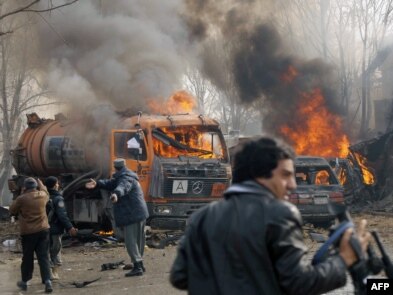Afghan forces arrest suicide-bomb cell
| Publisher | Radio Free Europe/Radio Liberty |
| Publication Date | 3 February 2009 |
| Cite as | Radio Free Europe/Radio Liberty, Afghan forces arrest suicide-bomb cell, 3 February 2009, available at: https://www.refworld.org/docid/49904c6219.html [accessed 28 May 2023] |
| Disclaimer | This is not a UNHCR publication. UNHCR is not responsible for, nor does it necessarily endorse, its content. Any views expressed are solely those of the author or publisher and do not necessarily reflect those of UNHCR, the United Nations or its Member States. |
February 03, 2009
 The suicide attack in front of the German Embassy in Kabul was one of the group's attacks.
The suicide attack in front of the German Embassy in Kabul was one of the group's attacks.
KABUL (Reuters) – Afghan security forces have arrested a group of Taliban militants they say were behind a series of suicide-bomb strikes in the capital, Kabul, including one outside the German Embassy, an intelligence official has said.
The group of 17 men, led by a 23-year-old Pakistani national, had direct links with six suicide attacks in the past two years in various parts of the city, said Said Ansari, a spokesman for the National Security Department.
The arrests were made in several parts of the capital last month, days after a suicide car-bomb attack outside the German Embassy that killed four Afghan civilians and one U.S. soldier, Ansari told a news conference.
"The responsibles for national security ... managed to identify and arrest one of the very dangerous terrorist networks in Kabul after the suicide attack close to the German Embassy," he said.
The group of arrested men had facilitated the attacks, which were organized by a Pakistani militant group and the network of Sirajuddin Haqqani, a senior Taliban commander based in Pakistan's border tribal region, Ansari said.
According to the arrested men, all the suicide bombers in the six attacks were Pakistani nationals and had received training in the country's lawless tribal area, Ansari said. Twenty Afghans were killed and more than 120 wounded in the attacks.
Asked if Pakistan's ISI intelligence service had any links with the attacks, he replied: "Who arms Haqqani and organizes [him] and where has he established his bases?"
Afghan officials have repeatedly accused Pakistani intelligence agents of training Taliban militants to fight in Afghanistan to prevent the emergence of a strong Afghan state, allowing Pakistani forces to better defend the border with India.
Pakistan has always denied the charge, and the new civilian government in Islamabad has forged better ties with Afghanistan while Pakistani forces have mounted a series of operations against militants on their side of the rugged and porous border.
Since U.S.-led and Afghan forces toppled the Taliban in 2001, the Islamist militants have regrouped and, despite the presence of nearly 70,000 international troops, increased both the scope and scale of their attacks in the last year.
